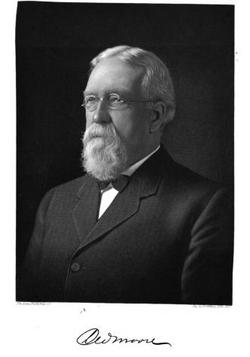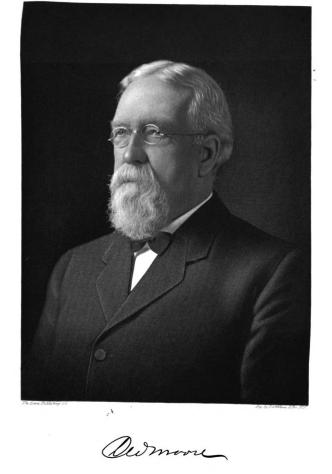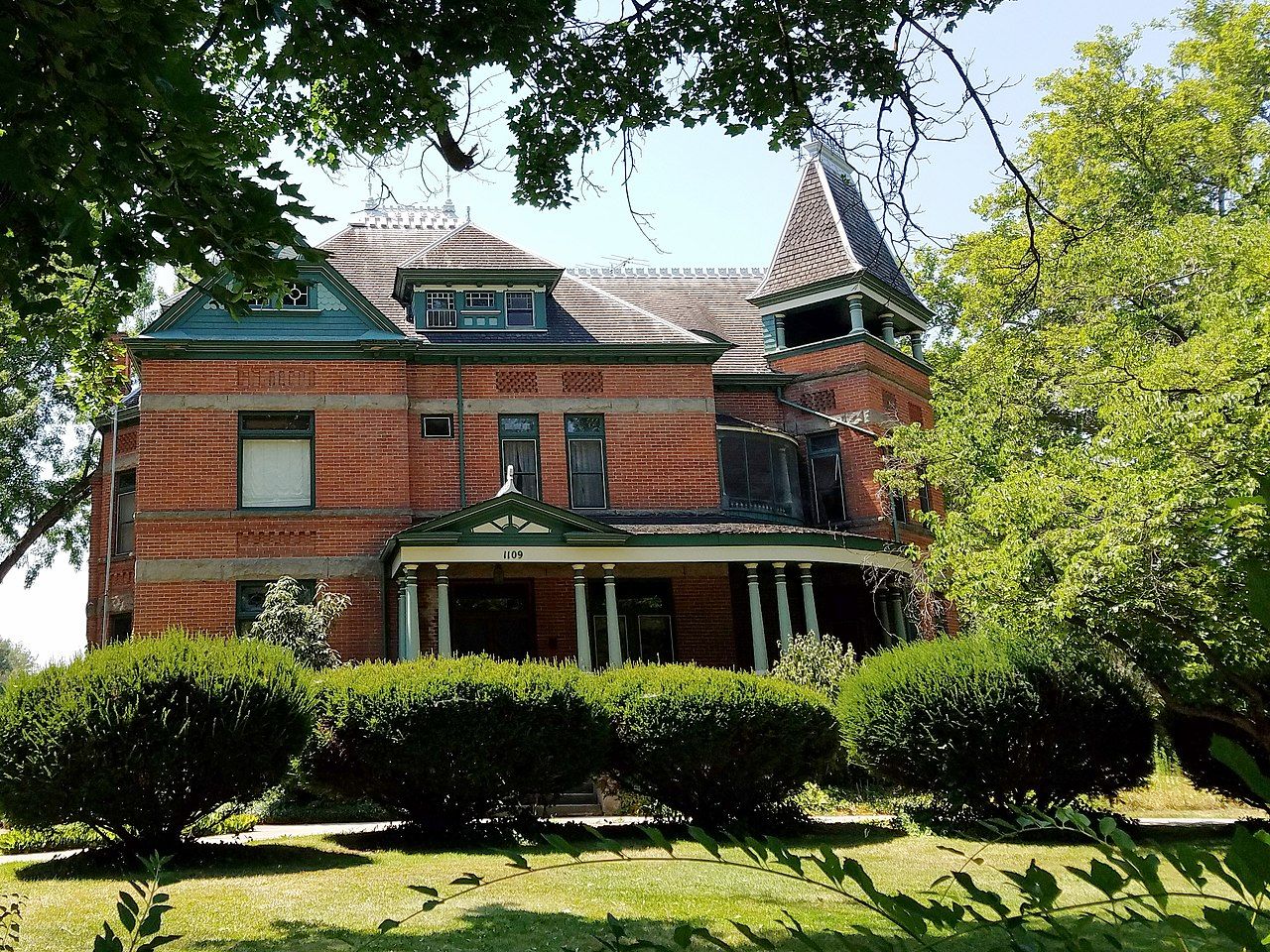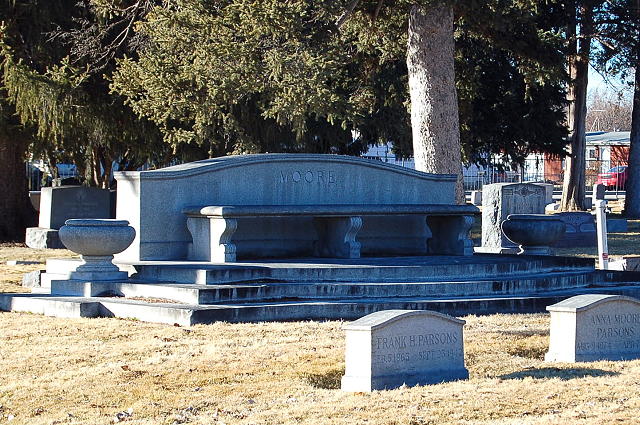"Christopher W. Moore. Among a goodly number of highly honored pioneers in
Boise, none has a warmer place in the regard of the public than has Christopher
Wilkinson Moore, a distinguished citizen of the city and for many years
president of the First National Bank of Idaho. Attainment of a high order has
been his portion in life, and he has taken his place as a leader in connection
with the mammoth material enterprises of the state, as well as in other phases
of life. A man of the most pronounced mentality and telling individuality and
personality, he has been one who indelibly left his mark upon the period in
which he labored, and in these later years, when he has felt it incumbent upon
him to withdraw in a measure from the turmoil of business activity, the power
and influence of his busier days is still pervading the circles in which he was
a dominant factor for so long. The natural resources of the state held a
generous share in his interest along the lines of development, and to him has
long been ascribed the credit for the establishing and carrying out of
enterprises that have wrought prodigiously in the upbuilding and development of
the state of Idaho, and of the capital city of that state, wherein he has so
long made his home.
"Born in Toronto, Canada, on November 30, 1835, Christopher Wilkinson Moore is
of Scotch-Irish descent and ancestry, and the son of Christopher and Eliza
(Crawford) Moore. These parents spent the greater part of their lives in and
about Toronto, where the father was engaged in farming and merchandising. Both
were members of the Methodist church, and their lives were well spent in every
sense. They were people who gained and retained the respect and esteem of all
who came within the circle of their acquaintance and when they departed this
life they left many to mourn their passing. The father died in the seventieth
year of his life and the mother lived to the age of sixty-six years. They became
the parents of six children.
"Christopher W. Moore was educated in the schools of Toronto and of Wisconsin,
whither the family moved when he was in his boyhood. On May 5, 1852, when he was
in his seventeenth year, he started with his parents and others of the family
for the Pacific coast. The party, which included others besides his immediate
family, made the long and danger-fraught trip across the plains to Oregon with
teams, and they experienced many an unexpected hardship before their western
destination was reached. Some three hundred head of cattle and horses made up
their train of live-stock, and Mr. Moore was one of the drivers. The principal
difficulty they encountered was that of finding feed for their stock, for
advance parties of emigrants with their stock had bared the usual grassy spots,
and it became the custom of Mr. Moore and another of the party to drive the
stock several miles to places where they might find feed. There they would wrap
themselves in buffalo robes taken for the purpose, and lying down, sleep until
break of day, when they would peer cautiously from their hiding places in search
of Indians, then if the coast was clear, catch their horses and drive the stock
back to camp. On one occasion they made a drive of forty miles in search of feed
and water. Reaching Snake river, they found there was nothing for them unless
they swam across, where they could see an abundance of luxuriant grass. Mr.
Moore and another young man of his age undertook this task, and their
self-imposed task resulted in the death of his companion, who with his horse was
caught in a whirlpool. The unfortunate youth, hampered by his heavy boots and
clothing, although an excellent swimmer, made little headway against the stream,
and before Mr. Moore could reach him, sank from view. Some days later his body
was recovered, some distance down the river, in Salmon Falls. This unhappy
affair was but one of a series of occurrences that marred the trip of these
emigrants to the western coast. But a few days after the drowning incident, a
white man was found dead, not far from camp, and though the first thought was
that it was the deed of a skulking Indian, they found, on tracking the murderer
to the river bank, that his footsteps were those of a white man, judging from
the heel marks. The arrest of the man followed, and it developed that he had
wantonly shot down his victim in cold blood, because of some trifling difference
they had experienced as to who should be the owner of a stray cow they had come
upon. The man was found guilty, and in accordance with the swift justice that
held sway in the West in those early days, was promptly blindfolded and shot,
and buried in the grave with his unfortunate victim. So much for the more
unhappy experiences of the western home seekers in the fifties.
"It follows, naturally, that the pioneers who found homes in a new country in
those days did so at great peril to themselves, and their efforts in developing
and bringing up the new country to some semblance of civilization in the early
fifties and sixties was a work fraught with the greatest dangers to life and
happiness. But they were all men cast in a heroic mold, and their work then bore
abundant fruit in the seventies and eighties, and is still shedding its
influence abroad in the land today, when the state of Idaho, with its cities of
metropolitan cast and its progressive methods, takes its place with the greatest
commonwealths of the Union. The name of Christopher W. Moore must inevitably
have a lasting place on the roster of those men who have been influential in
bringing about the present creditable conditions here existing, and too much may
not be said in praise of their noble efforts and of the actual work they
wrought.
"When Mr. Moore found himself settled in the West, he first concerned himself
with the selling, buying and raising of live-stock, shipping principally to
Puget Sound and Victoria, in British Columbia. It was thus that he gained his
independent start in life. In 1862 he went to Northern Idaho and in the
following year located on the spot where Boise in later and happier years reared
her head and advanced to such a state of prosperity that she inevitably became
the capital of the state. Though he had no intention of remaining there
permanently then, Mr. Moore gave early evidence of his farsightedness by camping
on the site of the city, and throughout the long intervening years the place
that became Boise has represented his home and the center of his chief
activities. He has been prominently identified with the development of its chief
business interests, especially in the merchandise business, with which he early
became associated. He operated stores in Boise, Booneville, Ruby City and Silver
City, and he was the first merchant in Owyhee county. In 1867 he joined forces
with B. M. DuRell, William Roberts and D. W. Ballard, the latter becoming a
later governor of the state, and the four organized the First National Bank of
Idaho at Boise. Mr. DuRell was the first president and Mr. Moore the first
cashier. It is a notable fact that Mr. Moore is the sole survivor among the men
who organized and established this well known financial institution. For nine
years he served as cashier, then withdrew from that office and until 1890 he
acted as a member of the bank's directorate. It is generally conceded in Boise
that to his excellent judgment is due much of the success that came to this
bank, and he was known widely during the years of his financial activity as a
man of the soundest judgment in banking matters, progressive, yet safe and sane
at all times. This was the second national bank to be organized west of the
Rockies, the other being the First National Bank of Portland, Oregon. It is but
due to the bank and those men who made it the solid institution it is to say
that it has been a decided credit to the city, reflecting great credit upon all
who were concerned with it.
"Mr. Moore, in the years of his business activity, was known as a man of the
most resourceful mind, with a genuine capacity for business that made him a
power in whatever commercial, industrial or financial circles he chose to enter.
In various ways he has maintained and promoted the material welfare of this
city, some of which may be mentioned here briefly. He has been president of the
Artesian Hot and Cold Water Company since its organization, which furnishes hot
and cold water to the best residence district in Boise, and as became one who
was a true pioneer and a progressive man in all things, it was left to him to
introduce the hot water heating system into Boise, his own home boasting the
first heating plant. He was long a director of the Capital Electric Light and
Power Company, and has been for years largely connected with farming and
stock-raising, although in more recent years he abandoned that work to the
control of his sons. In later years he has withdrawn little by little from all
connection with the business activities of the city, and is content to take his
ease, secure in the knowledge that he has performed his full share of the
development and settlement work of the city, county and state, and that others
may take up his work where he has laid it down.
"Mr. Moore is a man who has all his life given his support to the principles of
Republicanism, and though a stanch citizen and a voter on every topic or
question that arises, he has never shown any inclination to mix in politics. He
is a member of the Pioneer Society of Idaho, of which he was long president, and
has a lively interest in the affairs of that worthy organization.
"On July 3, 1865, Mr. Moore was united in marriage with Miss Catherine Minear,
of West Virginia, a pioneer member of the Methodist Episcopal church of Boise,
and a lady who was greatly esteemed for the many Christian graces that adorned
her personality. Mrs. Moore's death occurred March 26, 1911. Three sons and
three daughters were born to Mr. and Mrs. Moore, namely: Alice, the wife of Dr.
H. L. Bettis; Laura B., who married J. W. Cunningham; Crawford; Anna L., the
wife of F. H. Parsons; Marion P. and Raymond H." [History of Idaho: a narrative
account of its historical progress..., Volume 3 by Hiram Taylor French (1914)]
"Christopher W. Moore. Among a goodly number of highly honored pioneers in
Boise, none has a warmer place in the regard of the public than has Christopher
Wilkinson Moore, a distinguished citizen of the city and for many years
president of the First National Bank of Idaho. Attainment of a high order has
been his portion in life, and he has taken his place as a leader in connection
with the mammoth material enterprises of the state, as well as in other phases
of life. A man of the most pronounced mentality and telling individuality and
personality, he has been one who indelibly left his mark upon the period in
which he labored, and in these later years, when he has felt it incumbent upon
him to withdraw in a measure from the turmoil of business activity, the power
and influence of his busier days is still pervading the circles in which he was
a dominant factor for so long. The natural resources of the state held a
generous share in his interest along the lines of development, and to him has
long been ascribed the credit for the establishing and carrying out of
enterprises that have wrought prodigiously in the upbuilding and development of
the state of Idaho, and of the capital city of that state, wherein he has so
long made his home.
"Born in Toronto, Canada, on November 30, 1835, Christopher Wilkinson Moore is
of Scotch-Irish descent and ancestry, and the son of Christopher and Eliza
(Crawford) Moore. These parents spent the greater part of their lives in and
about Toronto, where the father was engaged in farming and merchandising. Both
were members of the Methodist church, and their lives were well spent in every
sense. They were people who gained and retained the respect and esteem of all
who came within the circle of their acquaintance and when they departed this
life they left many to mourn their passing. The father died in the seventieth
year of his life and the mother lived to the age of sixty-six years. They became
the parents of six children.
"Christopher W. Moore was educated in the schools of Toronto and of Wisconsin,
whither the family moved when he was in his boyhood. On May 5, 1852, when he was
in his seventeenth year, he started with his parents and others of the family
for the Pacific coast. The party, which included others besides his immediate
family, made the long and danger-fraught trip across the plains to Oregon with
teams, and they experienced many an unexpected hardship before their western
destination was reached. Some three hundred head of cattle and horses made up
their train of live-stock, and Mr. Moore was one of the drivers. The principal
difficulty they encountered was that of finding feed for their stock, for
advance parties of emigrants with their stock had bared the usual grassy spots,
and it became the custom of Mr. Moore and another of the party to drive the
stock several miles to places where they might find feed. There they would wrap
themselves in buffalo robes taken for the purpose, and lying down, sleep until
break of day, when they would peer cautiously from their hiding places in search
of Indians, then if the coast was clear, catch their horses and drive the stock
back to camp. On one occasion they made a drive of forty miles in search of feed
and water. Reaching Snake river, they found there was nothing for them unless
they swam across, where they could see an abundance of luxuriant grass. Mr.
Moore and another young man of his age undertook this task, and their
self-imposed task resulted in the death of his companion, who with his horse was
caught in a whirlpool. The unfortunate youth, hampered by his heavy boots and
clothing, although an excellent swimmer, made little headway against the stream,
and before Mr. Moore could reach him, sank from view. Some days later his body
was recovered, some distance down the river, in Salmon Falls. This unhappy
affair was but one of a series of occurrences that marred the trip of these
emigrants to the western coast. But a few days after the drowning incident, a
white man was found dead, not far from camp, and though the first thought was
that it was the deed of a skulking Indian, they found, on tracking the murderer
to the river bank, that his footsteps were those of a white man, judging from
the heel marks. The arrest of the man followed, and it developed that he had
wantonly shot down his victim in cold blood, because of some trifling difference
they had experienced as to who should be the owner of a stray cow they had come
upon. The man was found guilty, and in accordance with the swift justice that
held sway in the West in those early days, was promptly blindfolded and shot,
and buried in the grave with his unfortunate victim. So much for the more
unhappy experiences of the western home seekers in the fifties.
"It follows, naturally, that the pioneers who found homes in a new country in
those days did so at great peril to themselves, and their efforts in developing
and bringing up the new country to some semblance of civilization in the early
fifties and sixties was a work fraught with the greatest dangers to life and
happiness. But they were all men cast in a heroic mold, and their work then bore
abundant fruit in the seventies and eighties, and is still shedding its
influence abroad in the land today, when the state of Idaho, with its cities of
metropolitan cast and its progressive methods, takes its place with the greatest
commonwealths of the Union. The name of Christopher W. Moore must inevitably
have a lasting place on the roster of those men who have been influential in
bringing about the present creditable conditions here existing, and too much may
not be said in praise of their noble efforts and of the actual work they
wrought.
"When Mr. Moore found himself settled in the West, he first concerned himself
with the selling, buying and raising of live-stock, shipping principally to
Puget Sound and Victoria, in British Columbia. It was thus that he gained his
independent start in life. In 1862 he went to Northern Idaho and in the
following year located on the spot where Boise in later and happier years reared
her head and advanced to such a state of prosperity that she inevitably became
the capital of the state. Though he had no intention of remaining there
permanently then, Mr. Moore gave early evidence of his farsightedness by camping
on the site of the city, and throughout the long intervening years the place
that became Boise has represented his home and the center of his chief
activities. He has been prominently identified with the development of its chief
business interests, especially in the merchandise business, with which he early
became associated. He operated stores in Boise, Booneville, Ruby City and Silver
City, and he was the first merchant in Owyhee county. In 1867 he joined forces
with B. M. DuRell, William Roberts and D. W. Ballard, the latter becoming a
later governor of the state, and the four organized the First National Bank of
Idaho at Boise. Mr. DuRell was the first president and Mr. Moore the first
cashier. It is a notable fact that Mr. Moore is the sole survivor among the men
who organized and established this well known financial institution. For nine
years he served as cashier, then withdrew from that office and until 1890 he
acted as a member of the bank's directorate. It is generally conceded in Boise
that to his excellent judgment is due much of the success that came to this
bank, and he was known widely during the years of his financial activity as a
man of the soundest judgment in banking matters, progressive, yet safe and sane
at all times. This was the second national bank to be organized west of the
Rockies, the other being the First National Bank of Portland, Oregon. It is but
due to the bank and those men who made it the solid institution it is to say
that it has been a decided credit to the city, reflecting great credit upon all
who were concerned with it.
"Mr. Moore, in the years of his business activity, was known as a man of the
most resourceful mind, with a genuine capacity for business that made him a
power in whatever commercial, industrial or financial circles he chose to enter.
In various ways he has maintained and promoted the material welfare of this
city, some of which may be mentioned here briefly. He has been president of the
Artesian Hot and Cold Water Company since its organization, which furnishes hot
and cold water to the best residence district in Boise, and as became one who
was a true pioneer and a progressive man in all things, it was left to him to
introduce the hot water heating system into Boise, his own home boasting the
first heating plant. He was long a director of the Capital Electric Light and
Power Company, and has been for years largely connected with farming and
stock-raising, although in more recent years he abandoned that work to the
control of his sons. In later years he has withdrawn little by little from all
connection with the business activities of the city, and is content to take his
ease, secure in the knowledge that he has performed his full share of the
development and settlement work of the city, county and state, and that others
may take up his work where he has laid it down.
"Mr. Moore is a man who has all his life given his support to the principles of
Republicanism, and though a stanch citizen and a voter on every topic or
question that arises, he has never shown any inclination to mix in politics. He
is a member of the Pioneer Society of Idaho, of which he was long president, and
has a lively interest in the affairs of that worthy organization.
"On July 3, 1865, Mr. Moore was united in marriage with Miss Catherine Minear,
of West Virginia, a pioneer member of the Methodist Episcopal church of Boise,
and a lady who was greatly esteemed for the many Christian graces that adorned
her personality. Mrs. Moore's death occurred March 26, 1911. Three sons and
three daughters were born to Mr. and Mrs. Moore, namely: Alice, the wife of Dr.
H. L. Bettis; Laura B., who married J. W. Cunningham; Crawford; Anna L., the
wife of F. H. Parsons; Marion P. and Raymond H." [History of Idaho: a narrative
account of its historical progress..., Volume 3 by Hiram Taylor French (1914)]
Family Members
Sponsored by Ancestry
Advertisement
Advertisement






















